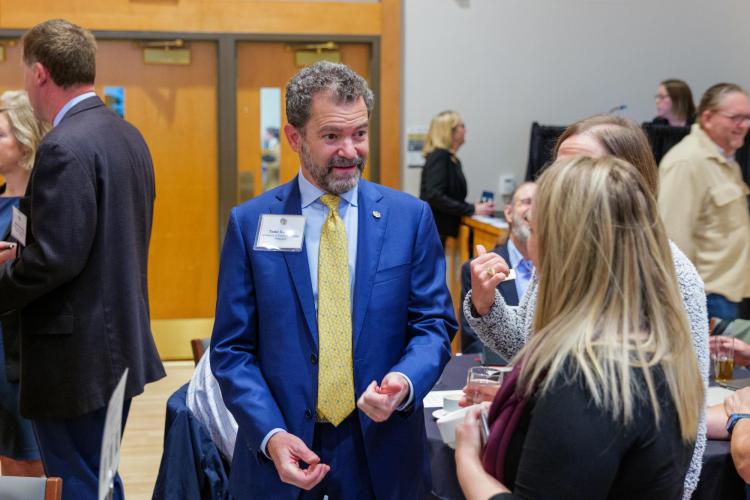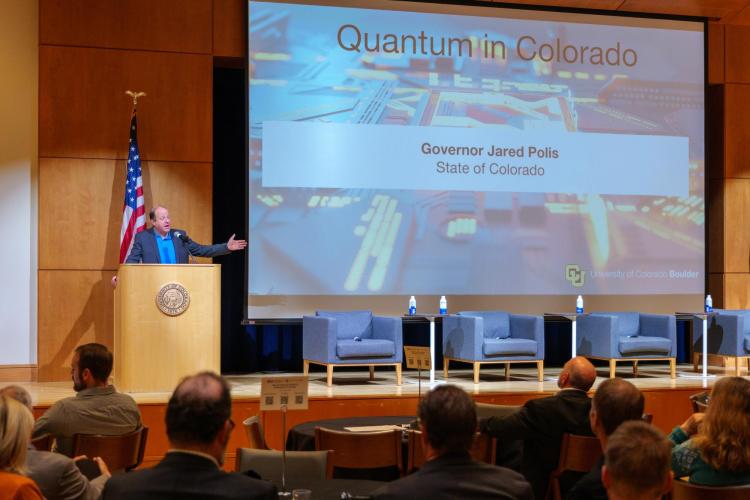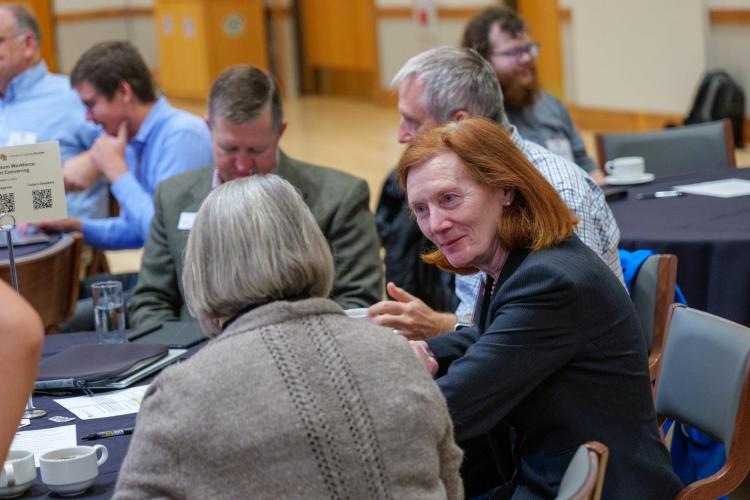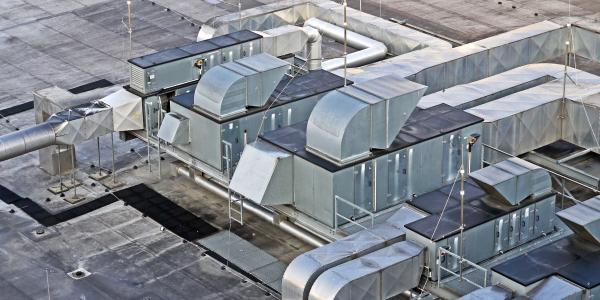Corey Stambaugh, chief of staff of the Physical Measurement Laboratory (PML) within the National Institute of Standards and Technology (NIST) and adjunct professor of physics at Montgomery College, speaks at the Colorado Quantum Workforce Development Convening. Photo by Patrick Campbell/CU Boulder.
Leaders from Colorado’s growing quantum ecosystem convened on campus last week to roll up their sleeves and begin mapping out a roadmap for workforce development in this new and growing field.
Gov. Jared Polis kicked off the Friday morning event, attended by state legislators, leaders representing higher education, industry, government and skill-building organizations.

CU President Todd Saliman speaks with attendees

Colorado Gov. Jared Polis addresses attendees

Margaret Murnane, a quantum physicist, MacArthur Award winner and CU Boulder distinguished professor
“I am really looking forward to the conversations and ideas that come out of this convening,” Polis said. “We need to make sure we are a leader in workforce (development); and make Colorado the leading quantum ecosystem—not just in the nation, but in the world.”
Also Friday, Polis issued a press release sharing a bipartisan letter to U.S. Secretary of Commerce Gina M. Raimondo and the Department of Commerce to formalize support for the Elevate Quantum Consortium in Colorado and its designation by the Economic Development Administration (EDA) as a Regional Technology Hub in Advanced Energy focused on quantum information science.
“Colorado is an undisputed leader in quantum research and technology translation and this designation will leverage our existing assets to help take Colorado and the quantum industry to the next level,’’ the letter stated.
CU Boulder hosted Friday’s event with support from Colorado's Office of Economic Development and International Trade to identify needs and develop a vision for a Colorado Quantum Education and Workforce Roadmap.
The day’s events included: opening remarks by Polis, CU President Todd Saliman and Corban Tillemann-Dick, founder and CEO of Maybell Quantum; a keynote from Corey Stambaugh of NIST; and panels on how to grow partnerships between industry, higher ed and national labs, and another on developing partnerships within the quantum ecosystem itself. Afternoon sessions brought together academic and industry leaders to identify gaps in quantum workforce training and build a vision that can enable a new and growing Colorado quantum industry ecosystem to thrive.
CU Boulder has long been recognized as a global leader in quantum research and education, and has produced four Nobel Prize winners in related fields. The workforce convening is among the programs covered by a new grant awarded by the state of Colorado’s Economic Development Commission.
The commission also funded two seed grants to the tune of $1.4 million over three years administered by CU Boulder’s CUbit Quantum Initiative that can be used by any Colorado research institution or industry partner, thus expanding the quantum ecosystem’s regional footprint.
Quantum in the marketplace
The goal of these grants is that they incentivize innovation and get quantum out of the lab and into the marketplace. Quantum science has many future practical applications in engineering, medicine, materials, energy and more.
Tillemann-Dick, possibly the state’s most vocal quantum advocate, said he imagines a day when you go to the doctor, get a blood draw, a quick drug trial and a prescription for the perfect regimen of medicine for you—with no side effects. (He admits that day may be a way off, but “in our lifetimes.”)
Speakers noted that quantum jobs are diverse and inclusive and not only for people with doctorates. Because so much quantum hardware gets built here, many of the quantum jobs are for welders, machinists, solderers and technicians—in addition to those who do the fundamental science girding the field and those who start quantum businesses.
“Discoveries in quantum science and technology are driving new applications and ultimately new horizons for humanity by advancing human health; position, navigation and timing technologies; sustainable energy and climate solutions; and advanced materials,” said Vice Chancellor for Research and Innovation and Dean of the Institutes Massimo Ruzzene.
“Discovery, development and implementation of these innovative applications requires a range of partners with diverse capabilities—the state of Colorado has a unique partner ecosystem that can make all of this possible.”
The national quantum economic landscape is experiencing rapid growth across the country, thanks to significant large public- and private-sector investments across industries.
To be well-positioned for large regional grants through the CHIPs Act or other federal legislation, Colorado is strategically building a strong quantum ecosystem that includes increasing the number of spinoff companies built from innovation coming out of Colorado’s research labs, as well as creating an organized system of education pipeline and workforce development.
The Colorado/Denver metro area and Front Range has the largest density of quantum industry in the U.S.
CU Boulder’s CUbit Quantum Initiative sits in the middle of it all. Pronounced “q-bit,” CUbit is an interdisciplinary hub for quantum research. Built to focus the nexus of CU Boulder, the National Institute of Standards and Technology’s physics division (as a core component of JILA) and quantum-focused companies, CUbit’s mission is to advance fundamental science and build a strong foundation for novel quantum technologies and their rapid dissemination, application and commercialization.
“This is an amazing opportunity for our state,” CU President Todd Saliman said. “We’ve got the bones right here in Colorado when it comes to quantum.”



